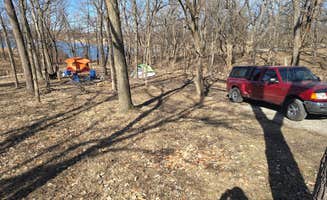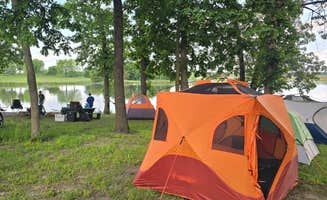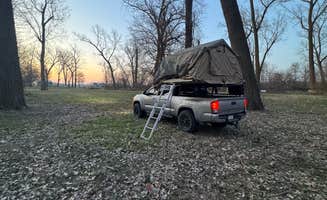Tent camping options near Amazonia, Missouri range from primitive to established sites within a 40-mile radius. Several conservation areas and county lakes offer access to fishing waters and wooded areas. The region experiences hot, humid summers with temperatures regularly exceeding 85°F, while spring and fall provide milder camping conditions with occasional thunderstorms.
What to do
Fishing from your campsite: At Hamilton City Lake, anglers can fish directly from their camping spots. The lake supports multiple species including bluegill, crappie, and bass, with no permit required for camping.
Visit multiple fishing ponds: Ross County Park offers several ponds for fishing enthusiasts. "Its more of a day trip kinda place. Multiple ponds," notes Jayson H., who adds, "Personally..... I love this place. One of my favorites to go fishing and drink a few."
Disc golf near camping: Mozingo Lake County Tent Campground provides access to recreational activities beyond just camping. According to Sayler O., "if you like disc golf than this is the place to go, there is a brand new 18 hole course right next to the camp!"
Birdwatching opportunities: Hoot Owl Bend offers prime habitat for viewing native birds. One camper notes, "This spot would be great for bird watchers," while mentioning the site's proximity to water.
What campers like
Quiet, secluded atmosphere: Many campers appreciate the peaceful nature of camping in this region. At Ross County Park, Kory K. reports it's a "nice out of the way location... perfect! Nice place to get away from people."
Shaded tent sites: Unlike many open-field campgrounds, Mozingo Lake County Tent Campground offers proper tree cover. A camper specifically appreciated that "the tent camping sites were actually surrounded by trees, I see way too many tent campsites that are basically just in the middle of a grass field."
Wildlife viewing: Camping in conservation areas provides opportunities to observe local wildlife. At Hoot Owl Bend, Carter G. shares the experience of hearing "animals huffing and saw some shadows run next to the truck at like 2am."
Free camping options: Several locations offer no-cost camping. Whitney L. notes that Agency Conservation Area provides "a free, quiet spot to boondock for the night safely," making it attractive for travelers passing through.
What you should know
Time restrictions at conservation areas: Several conservation areas have specific hours when camping is prohibited. At Agency Conservation Area, Zachary S. reports, "I guess the area is closed 10pm to 4am," which forced them to seek alternative locations.
Limited amenities at primitive sites: Most dispersed camping locations offer minimal facilities. At Hoot Owl Bend, a camper notes "there is no fire pit or amenities at this site" and advises wearing proper clothing to avoid stinging nettle when walking to the water.
Confusion about private property: Some camping areas have unclear boundaries with private land. A visitor to Hoot Owl Bend mentioned, "Was confused at first because there was a private road sign near the turn off, but after some looking it does look like it's a legit spot to camp."
Small camping areas: Many conservation areas have limited space for tents. Whitney L. describes Agency Conservation Area as having "a small (~1/8 of an acre maybe) gravel pullout off the dirt road" where camping is permitted.
Tips for camping with families
Look for playgrounds: When camping with children, Mozingo Lake County Tent Campground offers convenient recreation options. A reviewer mentions, "There are walking paths and a couple of playgrounds around the lake close enough to walk to but far enough away they wont ever be a bother."
Group campfire activities: Honey Grove Campground provides facilities for family-oriented campfire experiences. Adam M. describes, "Had a big fire outside one of the cabins today! Great company, warm flames, and hot dogs makes for a wonderful night," noting how the setting enhanced family enjoyment.
Consider noise factors: Hamilton City Lake offers natural experiences but with some compromises. A camper mentions the site is "fairly close to Highway 36, so you can hear some road noise," which families should consider when planning overnight stays.
Pack for wildlife encounters: Parents should prepare children for possible wildlife sightings at conservation areas. At Hoot Owl Bend, campers have reported wildlife activity during nighttime hours.
Tips from RVers
Limited designated camping areas: At Pony Creek Lake, RVers should note the unclear camping designations. Heidi H. explains, "I've only ever found one small area that's actually 'officially' marked for camping, and it's nowhere near any facilities."
Self-contained camping recommended: For camping at conservation areas and lakes without facilities, come prepared. "You better be prepared to be completely self contained," advises an experienced Pony Creek Lake camper.
Consider primitive options: At Pony Creek Lake, Shannon G. notes, "Primitive camping only" on a "mowed flat section" in the southwest area of the lake, indicating RVers should expect basic conditions.
Check seasonal conditions: Many conservation areas become difficult to access during wet periods. Whitney L. mentions regarding Agency Conservation Area that "the roads leading to the CA were well maintained and not muddy even after a ton of rain earlier in the week."




